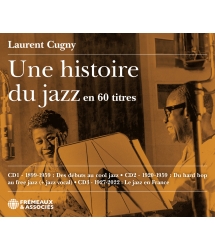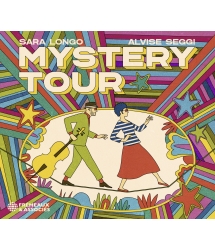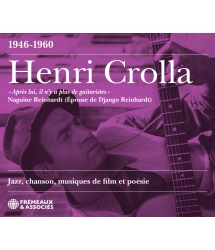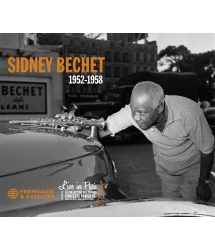- Our Catalog
- Philosophy
- Philosophers of the 20th century and today
- History of Philosophy (PUF)
- Counter-History and Brief Encyclopedia by Michel Onfray
- The philosophical work explained by Luc Ferry
- Ancient thought
- Thinkers of yesterday as seen by the philosophers of today
- Historical philosophical texts interpreted by great actors
- History
- Books (in French)
- Social science
- Historical words
- Audiobooks & Literature
- Our Catalog
- Jazz
- Blues
- Rock - Country - Cajun
- French song
- World music
- Africa
- France
- Québec / Canada
- Hawaï
- West Indies
- Caribbean
- Cuba & Afro-cubain
- Mexico
- South America
- Tango
- Brazil
- Tzigane / Gypsy
- Fado / Portugal
- Flamenco / Spain
- Yiddish / Israel
- China
- Tibet / Nepal
- Asia
- Indian Ocean / Madagascar
- Japan
- Indonesia
- Oceania
- India
- Bangladesh
- USSR / Communist songs
- World music / Miscellaneous
- Classical music
- Composers - Movie Soundtracks
- Sounds of nature
- Our Catalog
- Youth
- Philosophy
- News
- How to order ?
- Receive the catalog
- Manifesto
- Dictionnary











- Our Catalog
- Philosophy
- Philosophers of the 20th century and today
- History of Philosophy (PUF)
- Counter-History and Brief Encyclopedia by Michel Onfray
- The philosophical work explained by Luc Ferry
- Ancient thought
- Thinkers of yesterday as seen by the philosophers of today
- Historical philosophical texts interpreted by great actors
- History
- Books (in French)
- Social science
- Historical words
- Audiobooks & Literature
- Our Catalog
- Jazz
- Blues
- Rock - Country - Cajun
- French song
- World music
- Africa
- France
- Québec / Canada
- Hawaï
- West Indies
- Caribbean
- Cuba & Afro-cubain
- Mexico
- South America
- Tango
- Brazil
- Tzigane / Gypsy
- Fado / Portugal
- Flamenco / Spain
- Yiddish / Israel
- China
- Tibet / Nepal
- Asia
- Indian Ocean / Madagascar
- Japan
- Indonesia
- Oceania
- India
- Bangladesh
- USSR / Communist songs
- World music / Miscellaneous
- Classical music
- Composers - Movie Soundtracks
- Sounds of nature
- Our Catalog
- Youth
- Philosophy
- News
- How to order ?
- Receive the catalog
- Manifesto
- Dictionnary
94 - 96 THE RECORDINGS
FAPY LAFERTIN
Ref.: FA8521
Artistic Direction : DAVE KELBIE
Label : Frémeaux & Associés
Total duration of the pack : 2 hours 14 minutes
Nbre. CD : 2
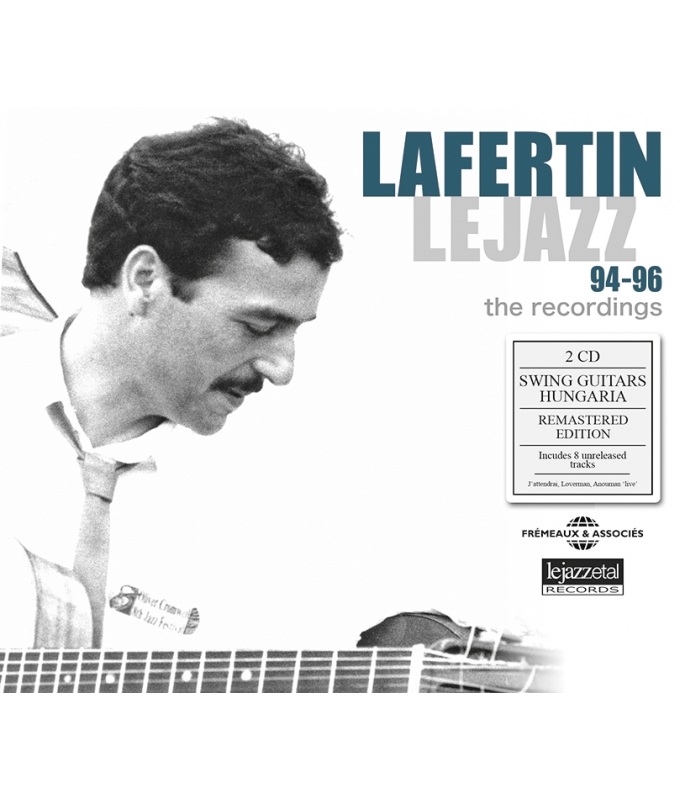
94 - 96 THE RECORDINGS
94 - 96 THE RECORDINGS
First released in 1994 and 1996, these two now-legendary albums have equal reputations as being both rare and major works in the genre they incarnate to perfection. The spirit of Django Reinhardt guides the playing of Fapy Lafertin: his choruses all show a rare elegance and precision together with a rhythmic pulse second to none, which make Lafertin more than a mere heir to the Master. Reissued in 2012 through Lejazzetal, this edition, re-mastered and augmented, presents Swing Guitar and Hungaria, recorded under pre-war conditions (direct sound-takes encircling a Thirties’ mic) and produced by Dave Kelbie, an unavoidable iconoclast and jazz figure, and probably the genre’s greatest producer (with credits including Evan Christopher’s Django à la Créole, Tcha Limberger etc.) Swing Guitar and Hungaria are indispensible to any jazz fan’s collection. Benjamin GOLDENSTEIN & Augustin BONDOUX
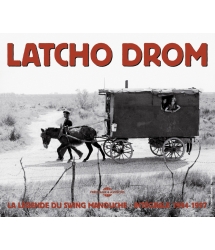
INTEGRALE 1994-1997
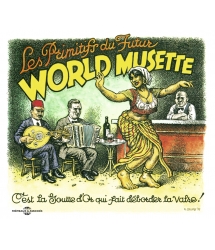
WORLD MUSETTE
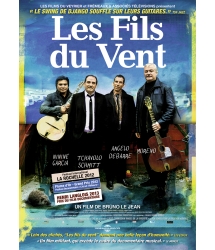
ANGELO DEBARRE, MORENO, NININE GARCIA ET TCHAVOLO...



Selected products

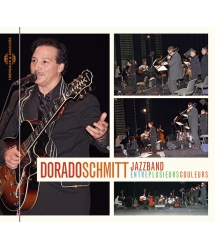
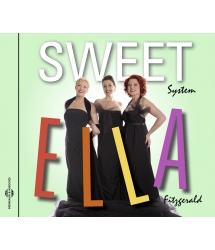
-
PisteTitleMain artistAutorDurationRegistered in
-
1I'Ve Had My MomentsFapy Lafertin00:03:031994
-
2I Wonder Where My Baby Is TonightFapy Lafertin00:02:471994
-
3Besame MuchoFapy Lafertin00:05:261994
-
4Vous qui passez sans me voirFapy LafertinPaul Misraki00:04:021994
-
5Swing GuitarsFapy Lafertin00:02:221994
-
6Je suis seul ce soirFapy Lafertin00:03:281994
-
7Puttin On The RitzFapy Lafertin00:03:041994
-
8To Each His OwnFapy Lafertin00:05:051994
-
9DiminishingFapy Lafertin00:03:111994
-
10Minor SwingFapy Lafertin00:03:031994
-
11La DéfenseFapy Lafertin00:03:301994
-
12Que reste t'il de nos amours ?Fapy LafertinCharles Trenet00:04:291994
-
13Swing GuitarsFapy Lafertin00:02:511994
-
14AnoumanFapy Lafertin00:05:551994
-
15Puttin' On The RitzFapy Lafertin00:03:061994
-
16Je suis seul ce soirFapy Lafertin00:04:371994
-
17I'Ve Had My MomentsFapy Lafertin00:03:311994
-
18Minor SwingFapy Lafertin00:03:061994
-
19Anouman LiveFapy Lafertin00:06:231994
-
PisteTitleMain artistAutorDurationRegistered in
-
1Melancholy BabyFapy Lafertin00:03:091996
-
212Th YearFapy Lafertin00:03:071996
-
3Songe d'automneFapy Lafertin00:03:491996
-
4Time On My HandsFapy LafertinGordon00:03:431996
-
5Billet DouxFapy Lafertin00:02:361996
-
6Russian LullabyFapy Lafertin00:02:561996
-
7StardustFapy LafertinM. Parish00:04:161996
-
8HungariaFapy Lafertin00:03:261996
-
9Liebestraum n°3Fapy Lafertin00:03:101996
-
10Swing 42Fapy Lafertin00:04:021996
-
11StockholmFapy Lafertin00:03:391996
-
12Notes noiresFapy Lafertin00:02:211996
-
13What A Difference A Day MadeFapy LafertinStanley Adams00:03:401996
-
14Viper's DreamFapy Lafertin00:03:161996
-
15Black And WhiteFapy Lafertin00:02:561996
-
16J'attendraiFapy LafertinN. Rastelli00:02:331996
-
17LovermanFapy LafertinDavis00:04:451996
-
18What A Difference A Day MadeFapy LafertinStanley Adams00:03:431996
Lafertin Fa8521
LAFERTIN
LEJAZZ
94-96 the recordings
The venue was the Concorde Club in Eastleigh near Southampton, recently celebrating its 50th anniversary as a jazz club. The date was 5th October 1987. The hosts were a newly-formed, unknown Hot Club style quartet from the west of England called Quartet Le Jazz. The specially invited guest was the celebrated Manouche guitarist from Holland Fapy Lafertin, already established in the UK as the lead guitarist with the Belgian band Waso and at the time without doubt the most famous European Gypsy musician since the death of Django Reinhardt.
What followed was an artistic partnership lasting ten years, hundreds of appearances
Europe-wide, a dedicated following of admirers from all over the globe, and an influence which in the early 1990’s took this little-performed but widely loved style of music from performances in clubs, pubs and wine bars to captivating concerts on stages throughout the UK and the continent of Europe.
Another further achievement of this musical relationship is the creation of arguably two of the most influential albums released in the style in modern times. Viewed by many as the best Gypsy jazz albums since the last recorded releases of Quintet of the Hot Club of France, they reinforced the quintet’s reputation and contributed to the resurgence of the style amongst musicians and audience alike. A resurgence well under way since Waso in the 1970’s.
These two individually released single CDs which make up this double album; ’Swing Guitars’ in 1994 and ‘Hungaria’ in 1996, were the first on the Lejazzetal label and were to define the style of the record company ever since. It now has a global reputation as one specialising in capturing the best ‘live studio’ performance from some of the world’s leading acoustic musicians.
Le jazz was formed in the west country of England in 1986 by guitarist Pete Finch and violinist Steve Elsworth. Tony Bevir joined very soon after on double-bass and in early 1987 they became a quartet with the inclusion of Dave Kelbie on rhythm guitar
Le lieu, le Concorde Club à Eastleigh à côté de Southampton, qui célébrait récemment son cinquantième anniversaire en tant que club de jazz. La date, le 5 octobre 1987. Les tauliers, un quartet de l’Ouest de l’Angleterre, tout fraichement formé et encore inconnu, appelé Le Jazz. L’invité spécial, le célèbre guitariste manouche hollandais Fapy Lafertin, qui vivait déjà au Royaume-Uni en tant que guitariste leader de la formation belge Waso et qui était à cette époque le guitariste manouche le plus connu depuis la mort de Django Reinhardt.
Il s’ensuivit une collaboration artistique de 10 ans, l’engouement d’admirateurs de par le monde et une indéniable contribution dans le fait d’avoir, au début des années 1990, fait passer cette musique alors peu jouée, confidentielle mais très appréciée, des petits clubs ou bars à vins, aux salles de concert du Royaume-Uni et du reste du continent européen.
L’autre formidable aboutissement de cette histoire musicale réside dans la création de deux des albums les plus influents de l’époque dite contemporaine du genre. Beaucoup y voient les meilleurs disques de jazz manouche depuis les dernières sessions enregistrées par le Quintette du Hot Club de France. Ils ont forgé la réputation du quintet et ont contribué à la résurgence du style dans le cœur des musiciens et dans celui du public. Une résurgence engagée depuis « Waso » dans les années 1970.
Les deux disques qui forment ce double album : « Swing Guitars » (1994) et « Hungaria » (1996), furent les premiers à paraitre sur Lejazzetal dont ils ont depuis, défini la ligne artistique. Le label détient maintenant une réputation mondiale en ce qui concerne l’enregistrement « studio dans les conditions du direct » des plus grands musiciens acoustiques. Quant au groupe « Le jazz », il s’est formé dans les contrées Ouest de l’Angleterre sous l’impulsion du guitariste Pete Finch et du violoniste Steve Elsworth. Le contrebassiste Tony Bevir les joignit rapidement et ils devinrent ensuite un quartet lorsque Dave Kelbie s’ajouta à la guitare rythmique.
Fapy Lafertin - guitar
Steve Elsworth - violin
Dave Kelbie - guitar
Pete Finch - guitar
Tony Bevir - double bass
all arrangements by the Quartet
P 1994-1996-2012 Lejazzetal Records © 2016 Groupe Frémeaux Colombini under license from Lejazzetal
produced by Lejazzetal London
engineered by Lance Andrews & Andrew Stacey
remastered by Dave Kelbie, Dylan Fowler at Stiwdio Felin Fach www.taithrecords.co.uk
on 28/29 March 2012
design and artwork by Dave Kelbie
assisted by Kathryn at Prestset
photos by Marilyn Du Mars: Front cover, booklet pages 1, 7, 9, 10, 11, centre pages, 16, 18, 19, 20, 22
page 5 photo of the quartet by Bob Whitfield
manufactured by Frémeaux & Associés
thanks to all the enthusiastic and dedicated followers of this style, musicians and audience alike, who have continued stubbonly to pressure me into rereleasing these albums. Your patience has finally been rewarded.
Contact :
Lejazzetal Records London UK Frémeaux & Associés
Dave Kelbie Coordination: Augustin Bondoux / Benjamin Goldenstein
dave.kelbie@gmail.com info@fremeaux.com
for CDs, tour dates and more... full catalogue
www.lejazzetal.com www.fremeaux.com
swing guitars1994
original liner notes
Recorded at Dumpers House, Chew Magna, Avon 11-14 November 1994
Recording engineers - Lance Andrews & Andrew Stacey
Additional sound processing - Fapy Lafertin
Sleeve photographs - Marilyn Du Mars
Back cover photograph - Bob Whitfield
Special thanks to: Marilyn Du Mars, Garry Bradey, Lance Andrews, Andrew Stacey, Joy Corbett, Denis Holland
The original recordings of the Quintet of The Hot Club of France have made the virtuosity of Django Reinhardt and Stephane Grappelly legendary. Django had a remarkable talent for improvising extremely melodic lines over banal songs, or embellishing a simple harmonic sequence with near dissonances more associated with early twentieth century classical music.
These 1930’s recordings - using a single microphone - allow us to hear the sound as if in a live performance. Dozens of attempts to record Hot Club jazz with high fidelity contemporary recording methods have failed to match these originals. A key component of this style is the dense, clipped, engine-like and compulsive two-beat rhythm. Somehow this rhythm is lost in the perfection of modern sound reproduction which highlights each instrument individually.
The solution is clear: record it as did the Quintet. So we used a single, retired pre-war BBC ribbon microphone with a retired BBC sound engineer to drive it, hung it up in a barn somewhere in the West of England and adjusted the mix by moving our chairs. Only then did the monophonic sound with it’s flat dynamic range, poor frequency response and absence of harmonics seem good enough to invite Fapy Lafertin to join us.
Les premiers enregistrements du Quintette du Hot Club de France ont rendu la virtuosité
de Django Reinhardt et Stéphane Grappelli légendaires. Django avait un talent remarquable lorsqu’il s’agissait d’improviser des phrasés extrêmement mélodiques sur des chansons communes, ou pour embellir une séquence harmonique simple avec des dissonances proches, une pratique plus souvent associée à la musique classique du début du XXe siècle.
Ces titres réalisés dans les conditions des années 1930 (en utilisant un seul micro), nous permettent d’entendre le son comme s’il s’agissait d’une performance live.
Il y a eu des douzaines d’essais pour enregistrer du jazz « Hot Club » avec des méthodes modernes d’enregistrement haute-fidélité, elles ont toutes échouées dans leurs tentatives d’égaler les originaux. La clé pour comprendre ce style, réside dans la pompe, ce rythme mécanique compulsif en deux temps. D’une certaine manière on peut dire qu’avec la recherche de la perfection de la reproduction sonore moderne, que ce rythme, qui met en valeur chaque instrument individuel, s’est perdu.
La solution est simple : enregistrer dans la même configuration que le fit le Quintette. Nous avons donc utilisé un ancien micro de la BBC d’avant guerre (et mis aux manettes un ingénieur du son retraité de la BBC) que nous avons accroché au fin fond d’une grange quelque part dans le Nord de l’Angleterre. Nous ajustions le mix en déplaçant nos chaises. C’est seulement lorsque nous avions réussi à avoir un son monophonique avec une dynamique aplatie, une restriction des fréquences et une absence d’harmoniques, que nous pouvions inviter Fapy à nous rejoindre.
hungaria1996
original liner notes
Recorded at Dumpers House, Chew Magna, Avon 19-25 August 1996
Recording engineers - Lance Andrews
Sleeve photographs - Marilyn Du Mars
Back cover photograph - Bob Whitfield
Special thanks to: Marilyn Du Mars, Bob Wilber
As with our first CD “Swing Guitars” we recorded “Hungaria” in a fashion similar to that used by Django Reinhardt and Stephanne Grappelly and their quintet in the mid 1930’s. A very few photographic references, and a little experimentation pointed towards using one principal microphone (BBC circa 1938 in our case) for the whole band, and one or two ambience mics to highlight different dynamics.
As our intention was to record each track as a live performance, ie, no drop-ins, clean ups or overdubs, any performance imperfections in an otherwise perfect ‘take’ would remain. Lastly we adjusted our the mix by simply moving our chairs, the slightest movement greatly altering both the tonality of each instrument and the volume.
Our objective was simple; somehow to capture the spirit of the early recordings of the Quintet of the Hot Club of France and hopefully to get a little closer to the heart of a style that remains Europe’s greatest contribution to the world of jazz.
Our method was two fold; to get the style of the sound right, as well as the quality of sound.
The collaboration between the most celebrated Gypsy guitarist in the style and Le Jazz, and their combined enthusiasm for the music naturally determined the style of sound. The quality of sound, strictly monophonic, with flat dynamic range, poor frequency response and absence of harmonics we found merely to be a bi-product of playing and recording in a style long forgotten by most, and longed for by others.
Comme pour « Swing Guitars », notre premier CD, nous avons enregistré ce disque avec le même procédé que celui employé par Django Reinhardt, Stéphane Grappelli et leur quintet dans le milieu des années 1930. Quelques références photographiques et un peu d’expérimentation nous ont mené à utiliser un micro principal (un micro de la BBC de 1938) pour prendre le son de l’ensemble du groupe, ainsi que deux micros d’ambiances pour mettre en valeur les différentes dynamiques.
Comme notre intention était d’enregistrer chaque piste dans des conditions live, à savoir sans drop in, nettoyage ou overdub, toutes les imperfections durant une prise, que nous considérerions néanmoins parfaite, resteraient. A la fin nous ajustions le mixage en positionnant nos chaises, le moindre mouvement modifiant tant la tonalité que le volume de chaque instrument.
Notre objectif était simple, réussir en quelque sorte à capturer l’esprit des premiers enregistrements du Quintette du Hot Club de France en espérant nous approcher au plus près du cœur de ce style, qui reste à ce jour la plus grande contribution de l’Europe dans le monde du jazz.
La méthode était double, à savoir obtenir « le bon son » et le conjuguer avec une bonne qualité sonore. C’est la collaboration entre le plus célèbre guitariste manouche dans cette veine et « Le Jazz », ainsi que l’enthousiasme commun pour la musique, qui ont naturellement déterminé le style de son. Nous avons trouvé que la qualité du son, strictement monophonique, avec une dynamique aplatie, une restriction des fréquences et une absence d’harmoniques, allait de paire avec la manière de jouer et d’enregistrer un style longtemps oublié par les uns et inatteignable pour les autres.
swing guitars1994
11-14/11/94
01 I’ve had my moments 03:04
rec11/11/94 (Donaldson Kahn)
02 I wonder where my baby is tonight 02:48
rec11/11/94 (Donaldson Kahn)
03 Besame mucho 05:26
rec11/11/94 (Velazquez/Skylar)
04 Vous qui passez sans me voir 04:02
rec11/11/94 (Hess/Misraki/Trenet)
05 Swing guitars 02:23
rec12/11/94 (Reinhardt/Grappelly)
06 Je suis seul ce soir 03:29
rec12/11/94 (Durand/Casanova/Grosjean)
07 Puttin’ on the Ritz 03:04
rec11/11/94 (Berlin)
08 To each his own 05:05
rec12/11/94 (Livingston/Evans)
09 Diminishing 03:09
rec11/11/94 (Reinhardt)
10 Minor Swing 03:03
rec11/11/94 (Reinhardt/Grappelly)
11 La Defense 03:31
rec13/11/94 (Sharpe)
12 Que reste t’il de nos amours 04:30
rec12/11/94 (Trenet)
13 Swing Guitars 02:47
rec12/11/94 (Reinhardt/Grappelly)
14 Anouman 05:55
rec11/11/94 (Reinhardt)
previously unissued tracks
15 Puttin’ on the Ritz rec11/11/94 03:11
16 Je suis seul ce soir rec13/11/94 04:38
17 I’ve had my moments 03:34
18 Minor Swing rec11/11/94 03:06
19 Anouman ‘live’ rec02/07/95 06.23
hungaria1996
19-25/08/96
01 Melancholy baby 03:06
rec23/08/96 (Burnett/Norton/Watson)
02 12th year 03:03
rec21/08/96 (Reinhardt/Grappelly)
03 Songe D’Automne 03:34 Bob Wilber on clarinet
rec19/08/96 (Joyce)
04 Time on my hands 03:37
rec22/08/96 (Youmans/Gordon/Adamson)
05 Billet Doux 02:35
rec21/08/96 (Reinhardt/Grappelly/Yvain/Jouve)
06 Russian lullaby 02:52
rec24/08/96 (Berlin)
07 Stardust 04:16
rec24/08/96 (Carmichael/Parish)
08 Hungaria 03:23
rec20/08/96 (Reinhardt)
09 Liebestraum No3 03:10
rec24/08/96 (Reinhardt)
10 Swing 42 03:58 Bob Wilber on clarinet
rec19/08/96 (Reinhardt)
11 Stockholm 03:40 Bob Wilber on clarinet
rec19/08/96 (Reinhardt)
12 Notes noir 02:18
rec21/08/96 (Lafertin)
13 What a difference a day made 03:41
rec20/08/96 (Grever/Adams)
14 Viper’s dream 03:13
rec24/08/96 (Allen)
15 Black and white 02:53
rec24/08/96 (Reinhardt)
previously unissued tracks
16 J’attendrai rec21/08/96 02:36
(Olivieri/Rastelli/Poterat)
17 Loverman rec20/08/96 04:46
(Davis/Ramirez/Sherman)
18 What a difference a day made rec20/08/96 03:45
bob wilber1996
Bob Wilber has been recording as one of the world’s greatest reed players for nearly seventy years and needs little introduction.
A pupil of Bechet, he was a member of the Goodman and Condon bands and worked with every great name from the mid-period of jazz, including the World’s
Greatest Jazzband. His participation in this golden era has made him an eloquent champion of the cause for the continuation of the earlier jazz forms in the face of the misplaced search for continuous change.
The success of his Bechet legacy, the Goodman re-creation and the triumph of his Ellington soundtrack for ‘The Cotton Club’ are all testaments to his sound judgement.
In his earlier career he shared the stage twice with Django Reinhardt, at a private party in New York on New Year’s Eve in 1947 and at the Nice jazz festival in February 1948. Django’s entire instructions to the band on the former occasion were “play oompah”.
With these elements in his background it was a delight, but no surprise, when Bob agreed without hesitation to record with Le Jazz and Fapy Lafertin, whom he identifies as the legitimate heir of Django. The primitive recording technique was an added attraction. The three exquisite tracks speak for themselves.
Bob Wilber fait partie des plus grands souffleurs de la planète depuis près de 70 ans et n’a pas besoin d’être présenté.
Eleve de Béchet, il a joué notamment dans les orchestres de Benny Goodman et Eddie Condon, et a collaboré avec tous les grands noms de la période dite médiane du jazz, dont The World’s Greatest Jazz Band.
Sa contribution durant cette période dorée a fait de lui le chantre de la préservation des formes traditionnelles du jazz face à la recherche de perpétuelle de changement. Les succès de son groupe « The Bechet Legacy Band », de sa re-création des œuvres de Benny Goodman, comme de sa bande-originale ellingtonienne du film « The Cotton Club », sont des témoignages de la primauté de son apport musical. Dans sa prime jeunesse il a pu partager la scène deux fois avec Django Reinhardt, lors d’une fête privée à New-York pour le réveillon 1947 et au Nice Jazz festival en février 1948. Les seules instructions données au groupe par Django étaient de faire la pompe.
Avec tous ses éléments dans sa cahute, bien que ce soit sans surprise, c’était une joie d’apprendre que Bob enregistrerait sans hésitation avec Le Jazz et Fapy Lafertin, qu’il identifie comme l’héritier légitime de Django. La manière primitive d’enregistrer a également aidé à susciter son intérêt. Les trois pistes sublimes parlent d’elles-mêmes.
lance andrews1996
Lance Andrews, our engineer, smiling after seven days creating a sound he’s spent his professional life trying to avoid.
Lance Andrews, notre ingénieur du son, souriant après avoir passé sept jours à créer un son qu’il a essayé d’éviter pendant toute sa vie professionnelle.
Publiés en 1994 et 1996, voici deux enregistrements devenus légendaires qui portent le double estampillage de disques rares et majeurs du courant qu’ils incarnent avec perfection. L’esprit de Django Reinhardt guide le jeu de Fapy Lafertin, ses chorus d’une élégance et précision rares, son impulsion rythmique incomparable qui font de lui un continuateur plus qu’un simple héritier du maître. Ressortie en 2012 par Lejazzetal cette version augmentée et remasterisée présente « Swing Guitar » et « Hungaria », enregistrés dans les conditions d’avant guerre (prise directe en cercle autour d’un micro des années 1930), dans une production signée Dave Kelbie, figure incontournable, guitariste iconoclaste et sans doute plus grand producteur du genre (Evan Christopher’s Django à la Créole, Tcha Limberger,…). Indispensable à la discothèque de tout amateur de jazz.
Benjamin GOLDENSTEIN & Augustin BONDOUX
First released in 1994 and 1996, these two now-legendary albums have equal reputations as being both rare and major works in the genre they incarnate to perfection. The spirit of Django Reinhardt guides the playing of Fapy Lafertin: his choruses all show a rare elegance and precision together with a rhythmic pulse second to none, which make Lafertin more than a mere heir to the Master. Reissued in 2012 through Lejazzetal, this edition, re-mastered and augmented, presents Swing Guitar and Hungaria, recorded under pre-war conditions (direct sound-takes encircling a Thirties’ mic) and produced by Dave Kelbie, an unavoidable iconoclast and jazz figure, and probably the genre’s greatest producer (with credits including Evan Christopher’s Django à la Créole, Tcha Limberger etc.) Swing Guitar and Hungaria are indispensible to any jazz fan’s collection.
Benjamin GOLDENSTEIN & Augustin BONDOUX
swing guitars1994
I’ve had my moments
I wonder where my baby is tonight
Besame mucho
Vous qui passez sans me voir
Swing guitars
Je suis seul ce soir
Puttin’ on the Ritz
To each his own
Diminishing
Minor swing
La Defense
Que reste t’il de nos amours
Swing guitars
Anouman
previously unissued tracks
Puttin’ on the Ritz
Je suis seul ce soir
I’ve had my moments
Minor swing
Anouman ‘live’
hungaria1996
Melancholy baby
12th year
Songe D’Automne *
Time on my hands
Billet doux
Russian lullaby
Stardust
Hungaria
Liebestraum No3
Swing 42 *
Stockholm *
Notes noir
What a difference a day made
Viper’s dream
Black and white
previously unissued tracks
J’attendrai
Loverman
What a difference a day made
* features Bob Wilber on clarinet
